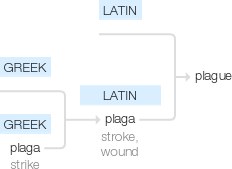Plague
late Middle English: Latin plaga ‘stroke, wound’, probably from Greek (Doric dialect) plaga, from a base meaning ‘strike’.
wiktionary
From Middle English plage, borrowed from Old French plage, from Latin plāga(“blow, wound”), from plangō(“to strike”). Cognate with Middle Dutch plāghe (> Dutch plaag), plāghen (> Dutch plagen); Middle Low German plāge; Middle High German plāge, pflāge (> German Plage); plāgen (> German plagen); Swedish plåga; French plaie, Occitan plaga. Doublet of plaga. Displaced native Old English wōl.
etymonline
plague (n.)
late 14c., plage, "affliction, calamity, evil, scourge, severe trouble or vexation;" early 15c., "malignant disease," from Old French plage (14c., Modern French plaie), from Late Latin plaga "affliction; slaughter, destruction," used in Vulgate for "pestilence," from Latin plaga "stroke, wound," probably from root of plangere "to strike, lament (by beating the breast)," from or cognate with Greek (Doric) plaga "blow" (from PIE root *plak- (2) "to strike").
Sometimes in Middle English also "a strike, a blow" (late 14c.). The Latin word also is the source of Old Irish plag (genitive plaige) "plague, pestilence," German Plage, Dutch plaage. Meaning "epidemic that causes many deaths" is from 1540s; specifically in reference to bubonic plague from c. 1600. Modern spelling follows French, which had plague from 15c. Weakened sense of "anything annoying" is from c. 1600.
plague (v.)
late 15c. (Caxton), "infest with disease or other natural calamity," from Middle Dutch plaghen, from plaghe (n.) "plague" (see plague (n.)). The sense of "vex, harass, bother, annoy" is recorded from 1590s. Related: Plagued; plaguing.
